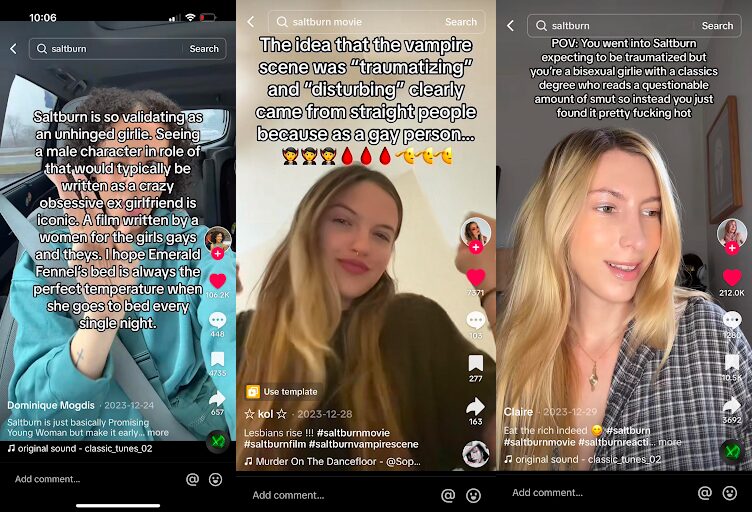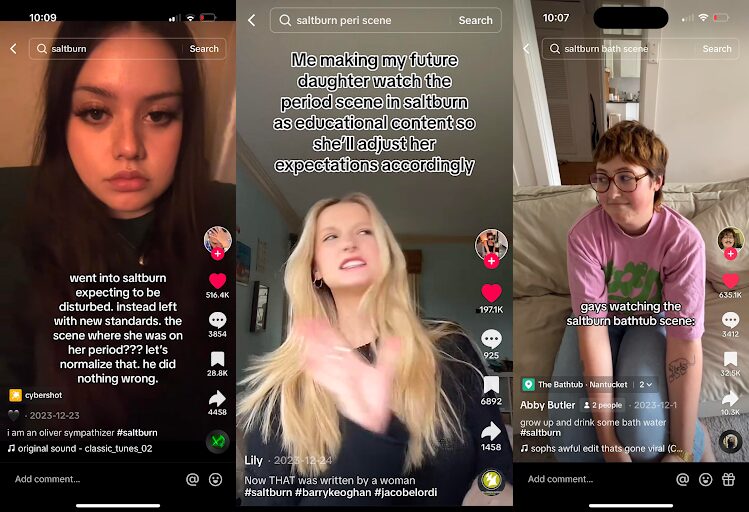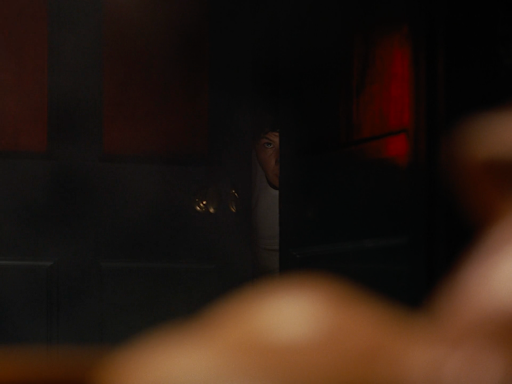Barely had the credits rolled on SALTBURN, and there I was, diving headfirst into the abyss of TikTok for my nightly doom scroll. Lo and behold, what do I find? A legion of teenage girls, seemingly possessed by the spirit of Sophie Ellis-Bextor’s “Murder on the Dancefloor.” Their mantra? A chorus of “Oliver did nothing wrong,” “SALTBURN is now the gold standard for my 2024 dating life,” and my personal favorite, “If you’re not fucking my grave after I die, then did you ever really love me at all?” I mean, SALTBURN was a wild ride, sure, but this? This was the real jaw-dropper. It’d be one thing if it were a handful of videos, but no, it’s an endless stream, a parade of queer, Gen Z women, all united in their unhinged adoration. Aren’t all these teens supposed to be prudes?! What in the Netflix-and-chill hellscape is going on?

SALTBURN is the latest cinematic brainchild of Emerald Fennell, who has a knack for making us squirm in our seats. This time, she spins the tale of Oliver Quick (Barry Keoghan), an awkward freshman who stumbles into the orbit of Felix Catton (Jacob Elordi), a wealthy student with charisma thicker than his wallet. Oliver, the poster child for “modest beginnings,” is summering at Felix’s lavish family estate, Saltburn, where he’s thrust into a soap opera of quirky relatives, mind games, plot twists, and some weird stuff happening in a bathtub.
Fennell, riding high on her PROMISING YOUNG WOMAN Oscar glory, infuses SALTBURN with the same satirical zest and a penchant for dark humor that’s as subtle as a sledgehammer. Critics have dubbed it “THE TALENTED MR. RIPLEY for the EUPHORIA Generation.” Sure, said with a sneer, but they’re not wrong. The film is a kaleidoscope of flashing lights, saturated colors, and Y2K needle drops.
SALTBURN has stirred controversy and split the room with critics and audiences alike. On another side of TikTok that I’m not on (“Straight TikTok”), you’ll be served videos of men dramatically gagging, gasping, and throwing tantrums over the film’s more “unconventional” scenes like Oliver’s bathtub water-tasting session, the “vampire” scene in the garden, and Oliver’s spur-of-the-moment grave defilement. Over on Letterboxd, the chin-stroking cinephiles are taking jabs at Fennell’s supposed ham-fisted attempt at class commentary. They’re nitpicking plot holes and questioning the effectiveness of her satire, with an echo chamber loud enough to fill the halls of Saltburn itself: “Fennell’s just stirring the pot for the shock value.”
Look, I’m no stranger to horny cinema. In fact, I’d say I’m a connoisseur of depravity and smut. CRUEL INTENTIONS was my teenage jam, and I’ve recently revisited David Cronenberg’s 1996 masterpiece CRASH—a film so steamy and scandalous it elicited walkouts during Cannes. It got slapped with an X-rating by the MPAA, only to rise like a phoenix as a cult classic. This is where the hypocrisy comes in. When Lars Von Trier or Cronenberg releases a movie dripping with depravity, everyone quickly throws words like “groundbreaking” or “visionary.” Their audacity is celebrated, their boldness revered. But Emerald Fennell? When she steps into the ring with the same gloves on, suddenly she’s “trying too hard.” This is the same uproar from the gentlemen’s club when PROMISING YOUNG WOMAN hit the screens and was quickly dubbed “virtue signaling.” It’s like she’s stuck in a catch-22—too bold, too blunt, too… Something. It seems Fennell can’t move without stirring the pot of male indignation.
Fennell isn’t playing the “pick-me” game with male audiences. Instead, she’s got her finger firmly on the pulse of a new wave of filmgoers who yearn for films that are sexy, bold, and irreverent—much like what we’ve seen from EUPHORIA. Her vision for SALTBURN wasn’t born from a desire to deliver a biting, poignant commentary about class dynamics and aristocracy. It hatched during the COVID lockdown, marinating in themes of voyeurism, desire, and obsession. Fennell’s hit the jackpot if the sheer volume of unhinged TikToks from young women is anything to go by. On the heels of the “Feral Girl Summer” trend, where women are rebelling against the relentless pursuit of self-optimization that dominates our social media feeds and instead celebrate an uncontrolled, unrestrained self, Fennell is churning content that resonates with this crowd of wild young women starving for connection. These girls have been living vicariously through screens for the past three years, missing out on the rites of passage like partying and hooking up. Instead, they’re deep in the trenches of parasocial relationships and the creation of fantasy worlds and scenarios where they are the main characters.

We see this understanding of women and the pulse of the parasocial generation in Fennel’s casting choices for SALTBURN. Jacob Elordi may be known for his hyper-masculine roles on-screen, like the possessive and dangerous Nate Jacobs in EUPHORIA or Elvis in PRISCILLA. But off-screen, the internet has dubbed him ”baby girl” for his endearing quirks, like his penchant for handbags and candid chats about same-sex celeb crushes. Despite his outward appearance, he’s the antithesis of the traditional Hollywood hunk, a sign of the times when the leading man mold is getting a much-needed overhaul. This shift is riding the wave of movements like #MeToo, which Fennell tackled head-on in PROMISING YOUNG WOMAN, and a broader cultural face-off with toxic masculinity, allowing actors like Elordi and Keoghan to explore more complex, emotionally layered characters.
Fennell takes this a step further in the portrayal of her characters by bringing these softer, more nuanced men to the forefront, placing them in roles of submission, and capturing their interactions through a lens that’s more arthouse porn than Hollywood blockbuster. The film’s sexually charged sequences, such as Felix’s masturbation scene in the bathtub, are shot from aesthetically beautiful, voyeuristic angles, creating a sense of eroticism that’s prolonged, soft, and distinctly different from the usual male gaze we see in mainstream cinema. This is especially evident in the homoerotic tension between Oliver and Felix, a dynamic that flips the traditional script of female characters being objectified in male-directed films. It’s a tone that feels definitively queer, not just between two men, but in the deeply resonant themes of “yearning” that’s become a poignant part of the queer narrative, especially during the COVID-19 pandemic. This yearning is expressed graphically and provocatively, but at its core, it is based on the longing and desire for connection, understanding, and acceptance.

As these striking scenes from SALTBURN replay in my mind, I can’t help but reflect on those reports about “Puriteens” that have been floating around in the media. These reports suggest that today’s youth are turning away from sex in films and that the rise of intimacy coordinators and careful choreography of intimate scenes are mere byproducts of “cancel culture.” They insinuate that this tactful shift in filmmaking is nudging us towards a prudish society in a post-Me Too era. However, I think these surveys and reports are missing the mark and asking the wrong questions. When you look at the response to a film like SALTBURN, there’s still a hunger for intimacy in cinema. However, what’s emerging is a call for a revolution in how intimacy is portrayed, a departure from the methods of the old guard. Young women, in particular, are seeking representations of their experiences and fantasies—the rollercoaster of adolescence, complete with menstruation and intense, almost obsessive crushes—in a manner that resonates with them, not as objects of the male gaze. What these young viewers crave isn’t the hyper-sexualized, surface-level depiction, but rather a more profound portrayal that captures the whirlwind of emotions they feel inside. They want to see unhinged, unfiltered, and brutally honest characters about their desires and quest for connection. It’s not about visual titillation; it’s about a heightened representation of their internal worlds, a reflection of their complex emotional landscapes. This shift isn’t about sanitizing cinema; it’s about redefining it to resonate more truthfully with a fiercely honest and unapologetic generation.
SALTBURN may not be everyone’s cup of tea, and yes, the story has its problems. Yet, it signals a seismic attitude shift among the younger film fans. The film is a raw, unapologetic salute to embracing one’s true, unfiltered self, societal norms be damned, where pleasure isn’t a taboo but a birthright.
If the constant stream of TikToks on my feed is any indication, Fennell struck gold. SALTBURN was the number one movie on Amazon Prime, has hit over 1.5 million viewers on Letterboxd, and even became unexpected (and maybe ill-advised) family holiday viewing—a twisted litmus test to see who’s ready to dive headfirst into this new, feral era of unbridled authenticity and debauchery. It’s messy, complicated, and, oh boy, is it shocking—but isn’t that just the perfect mirror for the world we’re living in?
















Comments